Abstract
1. Actions of histamine on the voltage-dependent Ba2+(Ca2+) currents (IBa, ICa) were investigated using the whole-cell patch-clamp technique on dispersed smooth muscle cells from the rabbit saphenous artery. 2. Histamine (half-maximal dose, EC50 = 530 nM) augmented the IBa evoked by a brief depolarizing pulse (100 ms duration; to +10 mV from a holding potential of -80 mV) in a concentration-dependent manner. The maximum augmentation was obtained with 30 microM-histamine (1.29 times control). This augmentation of IBa was inhibited by the H3-antagonist, thioperamide (Ki = 30 nM, slope of the Schild plot = 1.0), but not by H1- or H2-antagonists (mepyramine or diphenhydramine, or cimetidine, respectively). 3. An H3-agonist, R alpha-methylhistamine (EC50 = 93 nM), also augmented IBa in a concentration-dependent manner at a holding potential of -80 mV and the maximum augmentation (1.25 times control) was obtained with 10 microM. This augmentation was also inhibited by thioperamide, but not by the above H1- and H2- antagonists. 4. Intracellularly applied 500 microM-guanosine 5'-triphosphate (GTP) enhanced, but 1 mM-guanosine 5'-O-(2-thiodiphosphate) (GDP beta S) abolished, the histamine-induced augmentation of IBa. When one of the non-hydrolysable GTP analogues, guanosine 5'-O-(3-thiotriphosphate) (GTP gamma S; greater than 5 microM), guanylyl-imidodiphosphate (GMP-PNP; 200 microM) or guanylyl (beta, gamma-methylene)-diphosphonate (GMP-PCP; 1 mM) was intracellularly applied, the IBa amplitude evoked without the application of histamine was not affected, but the excitatory effect of histamine on IBa was reversed to an inhibition. Pre-treatment with pertussis toxin (PTX: 300 ng/ml and 3 micrograms/ml) did not modify the histamine-induced responses in the absence or presence of GTP gamma S. 5. 4 beta-Phorbol 12,13-dibutylate (PDBu) increased the amplitude of IBa. However, this action of PDBu was not enhanced by the application of GTP (500 microM) in the pipette, but additional application of histamine further increased the amplitude of IBa. Pre-treatment with a potent non-selective protein kinase inhibitor, 1-(5-isoquinolinesulphonyl)-2-methylpiperazine dihydrochloride (H-7; 100 microM), did not modify the histamine-induced current augmentation or inhibition observed in the presence or absence of intracellular GTP gamma S.(ABSTRACT TRUNCATED AT 400 WORDS)
Full text
PDF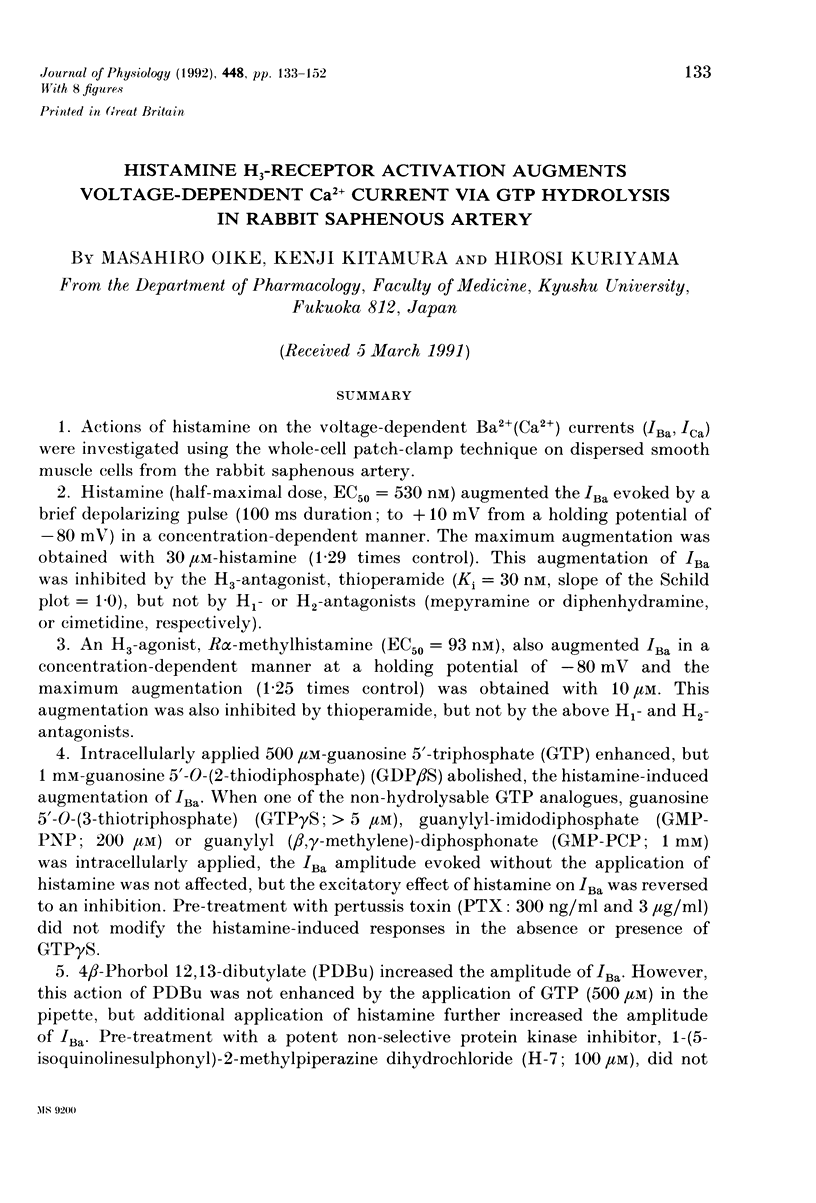
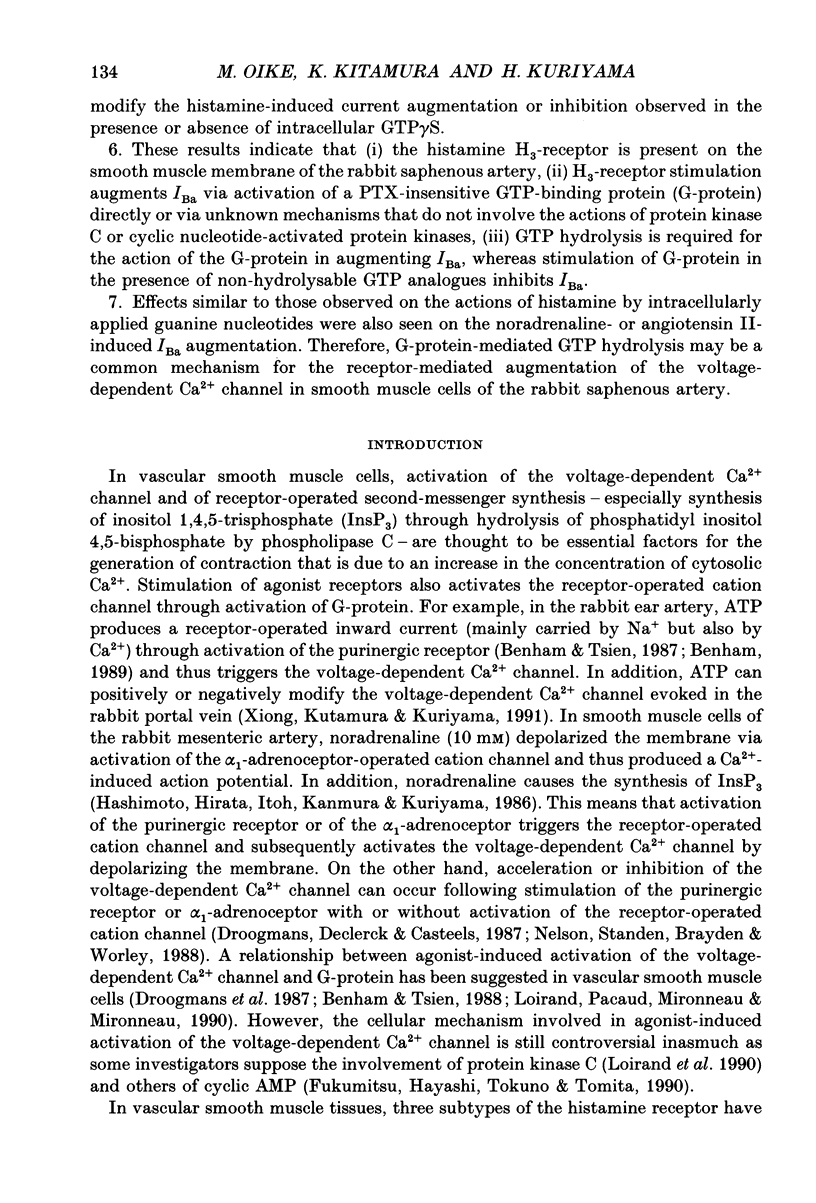
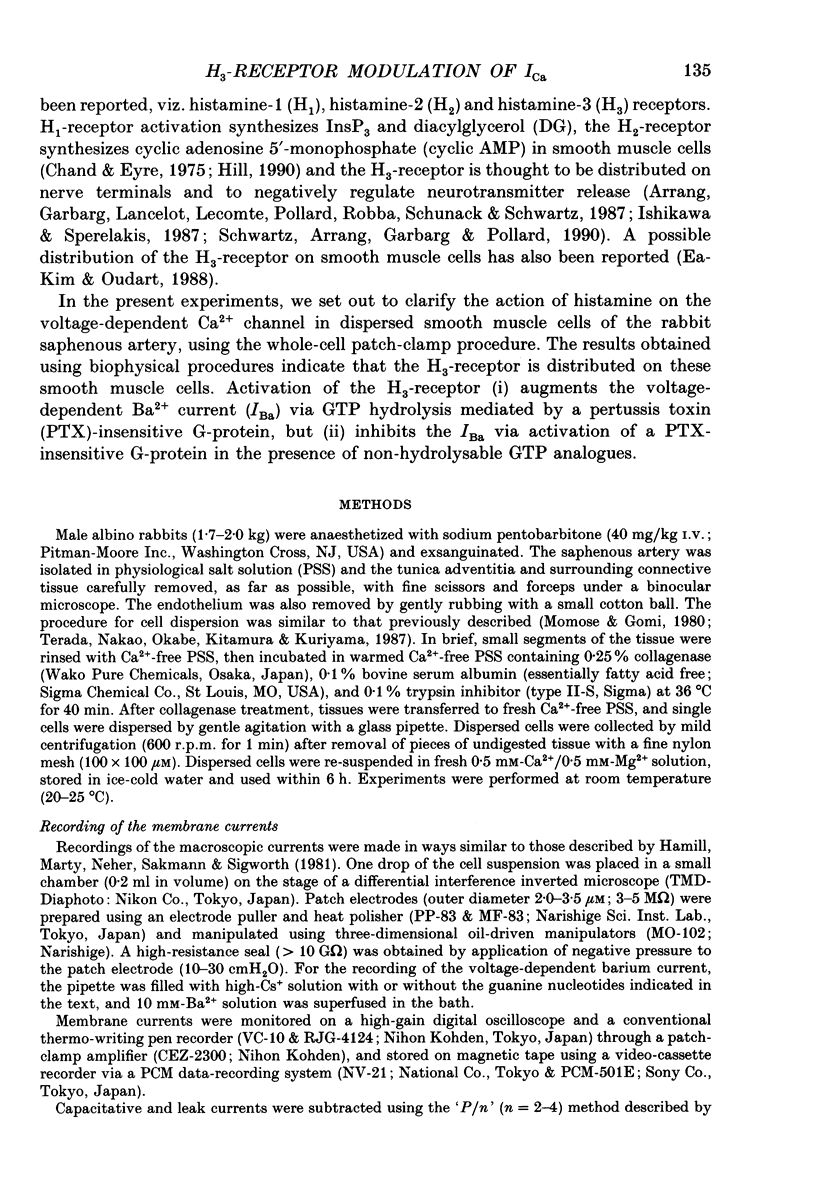
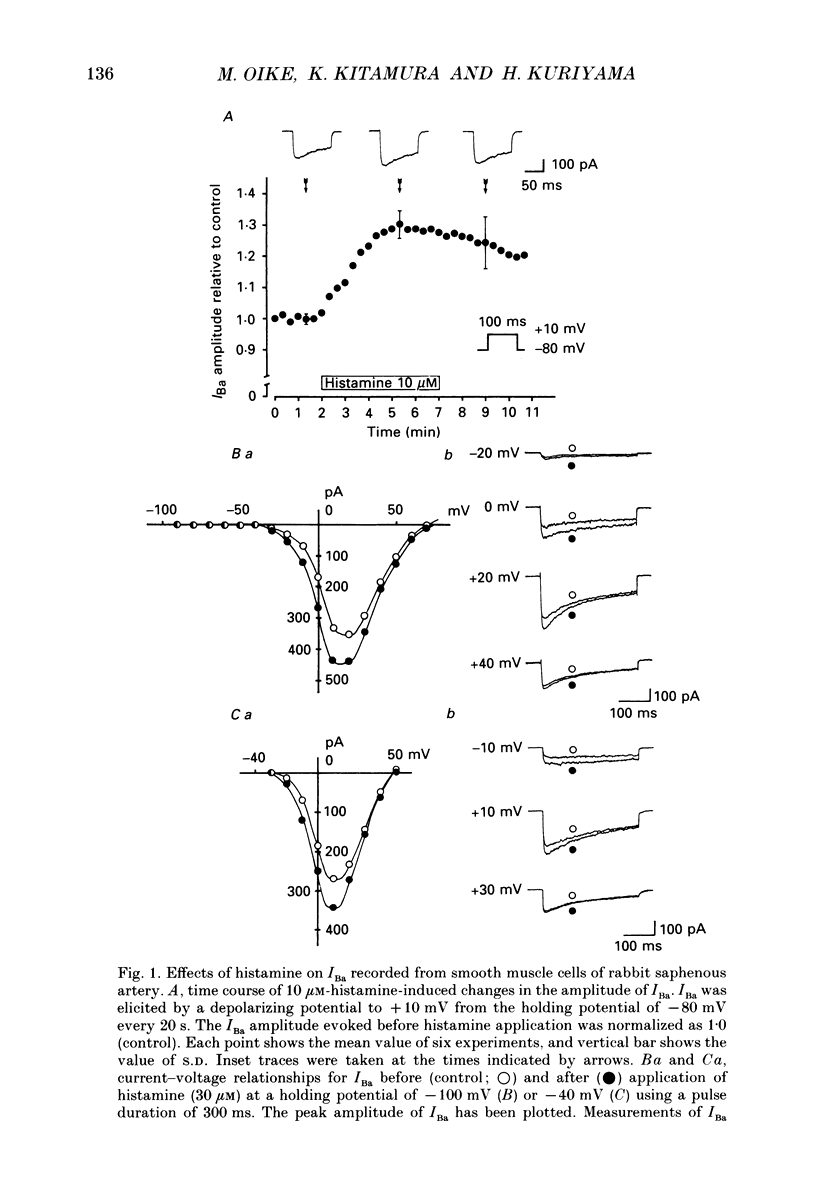
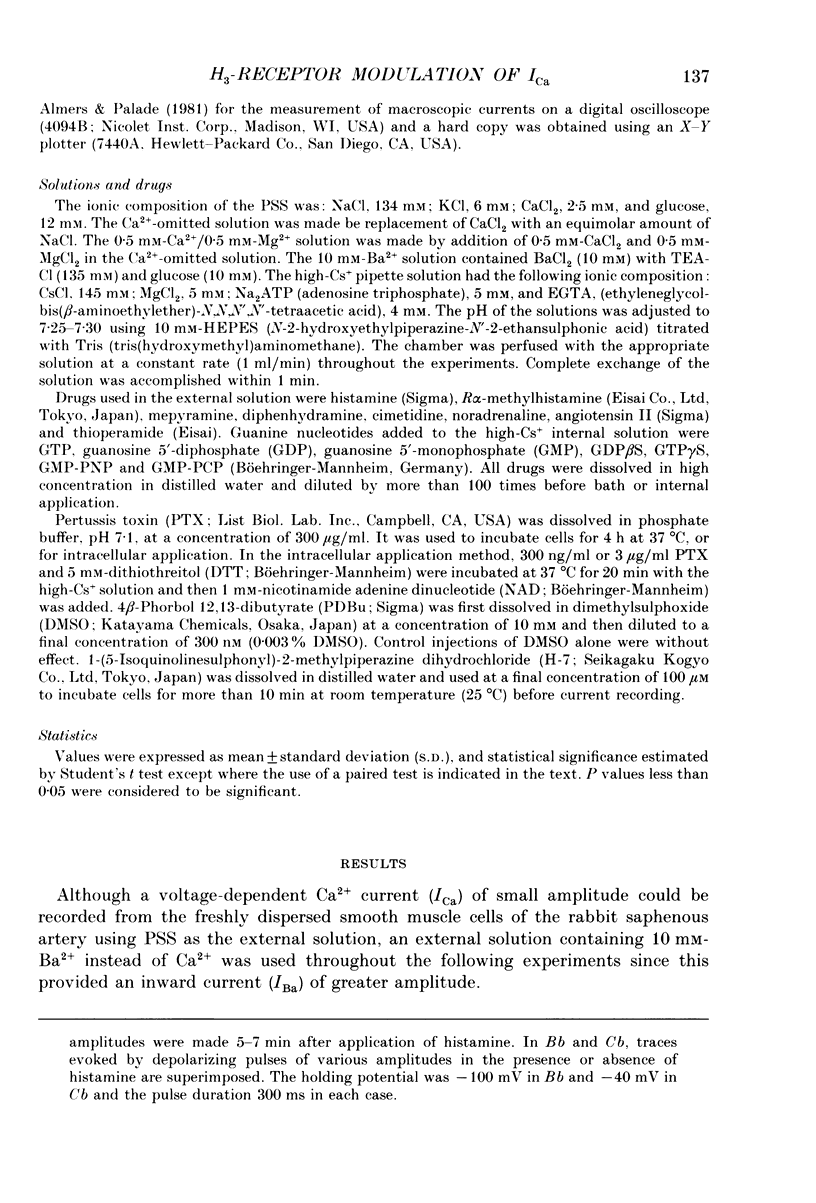
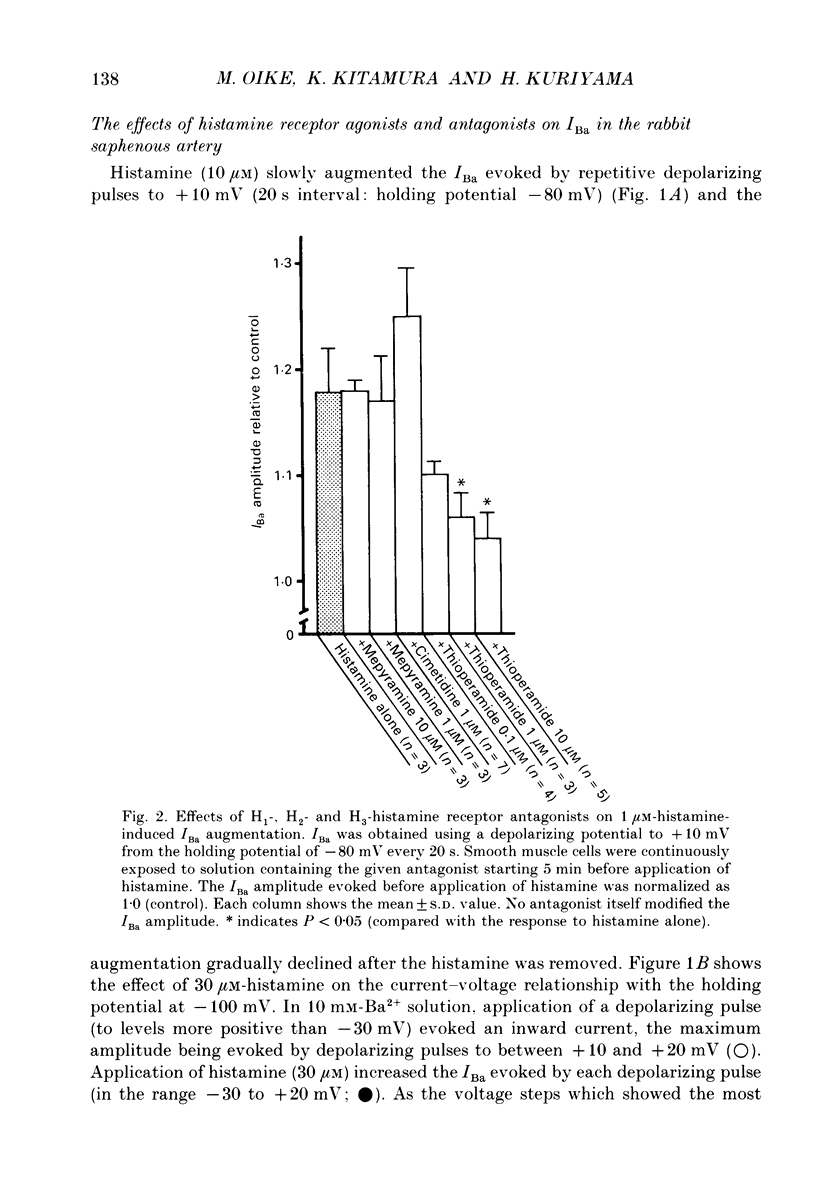
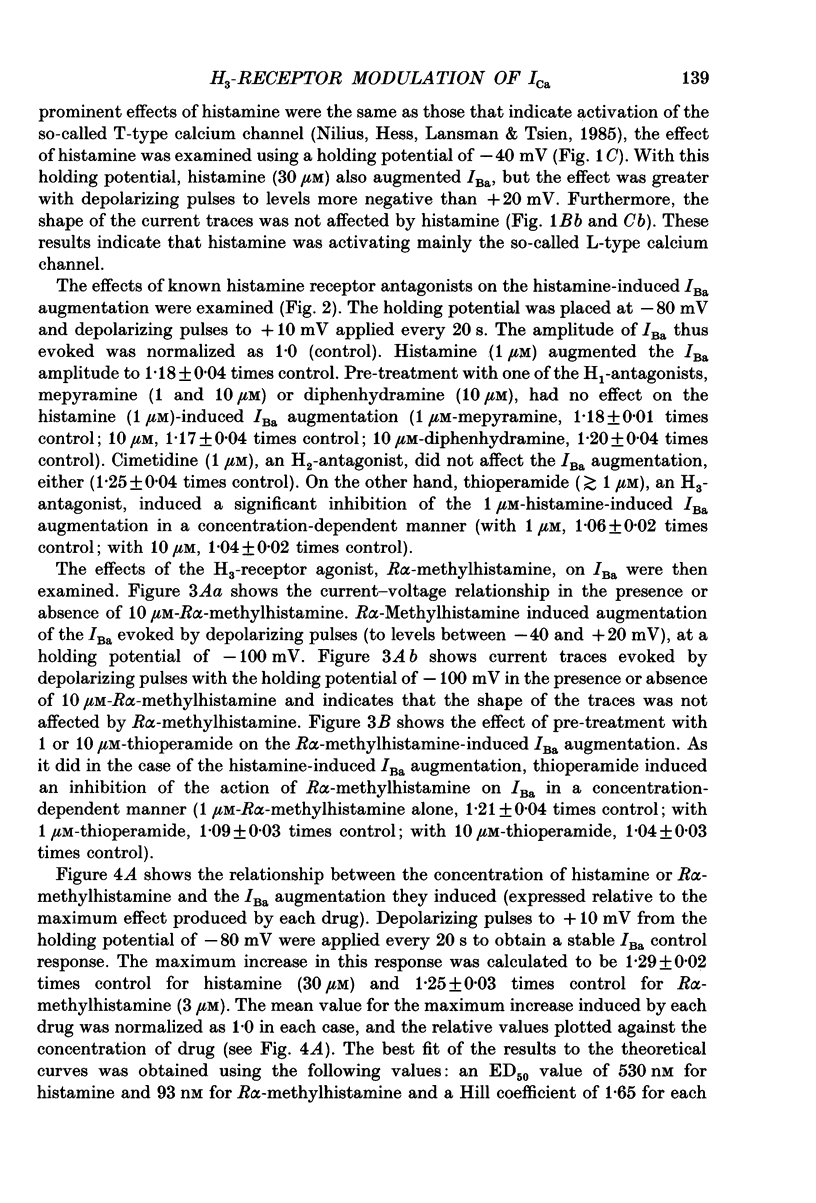
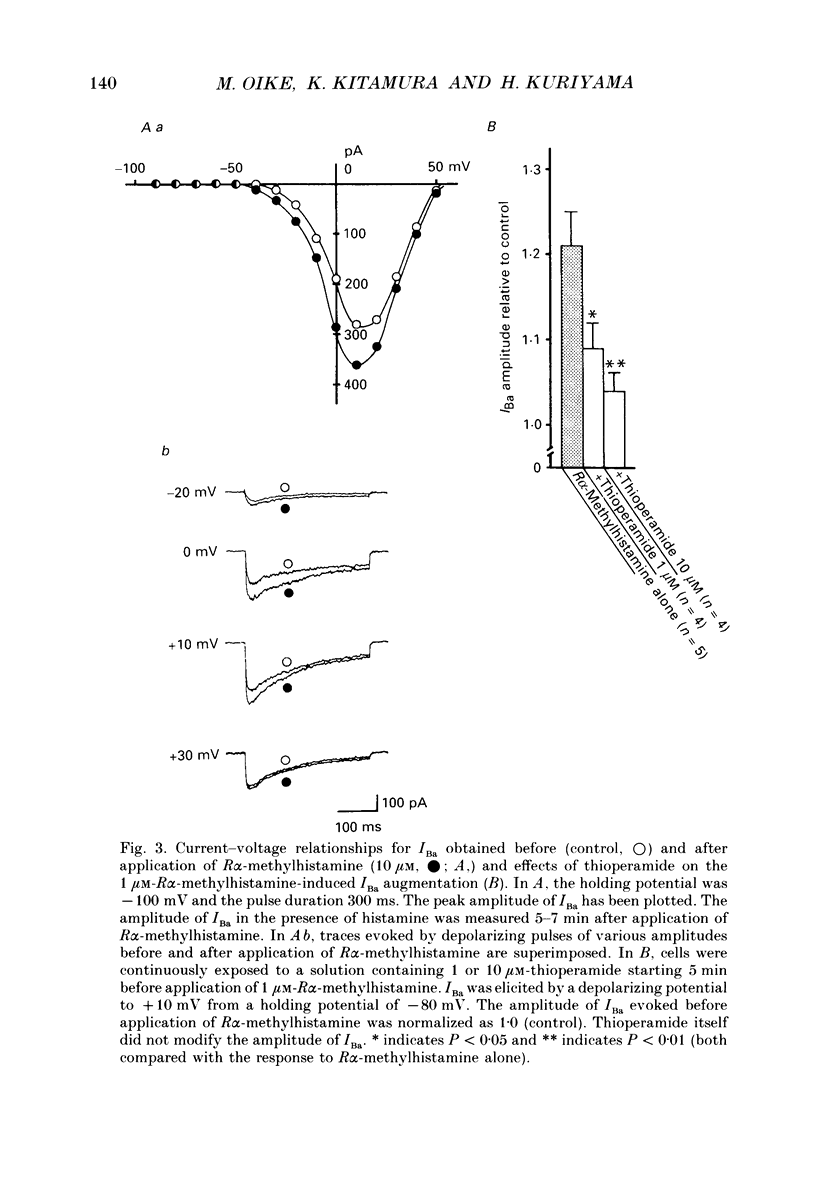
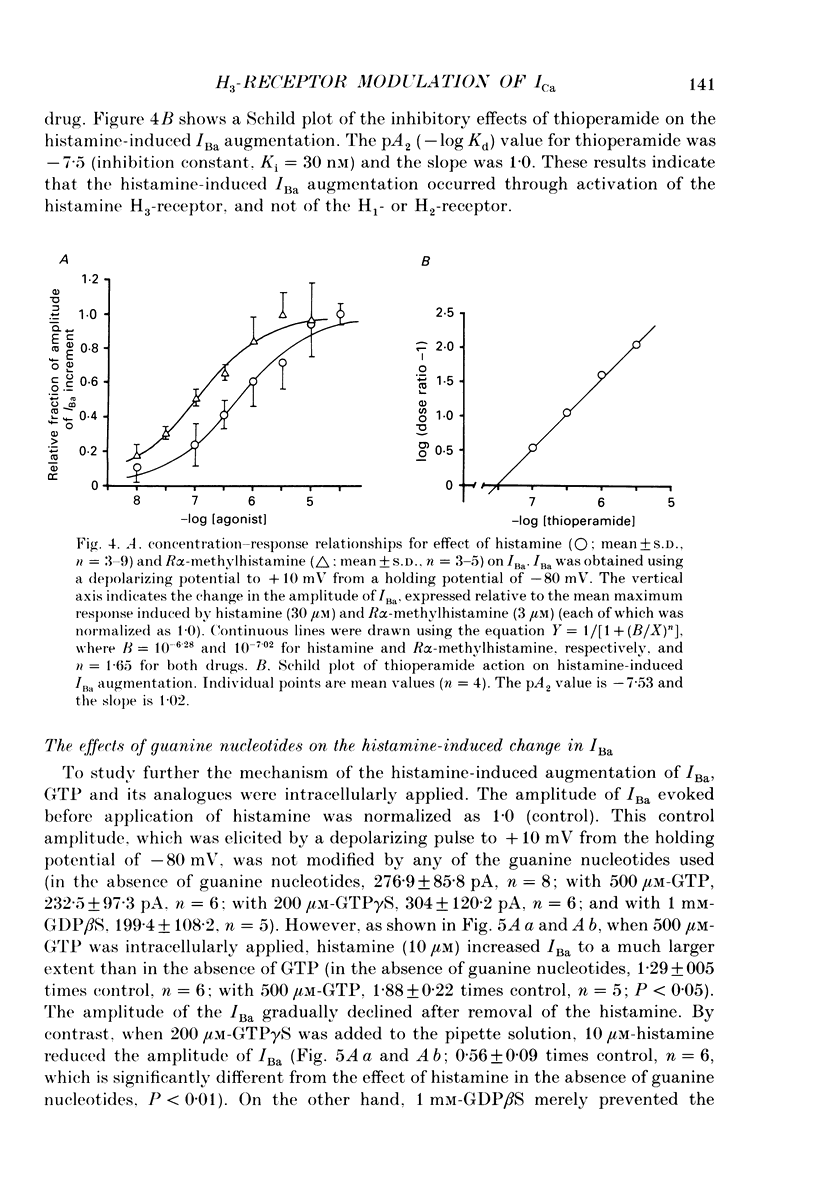
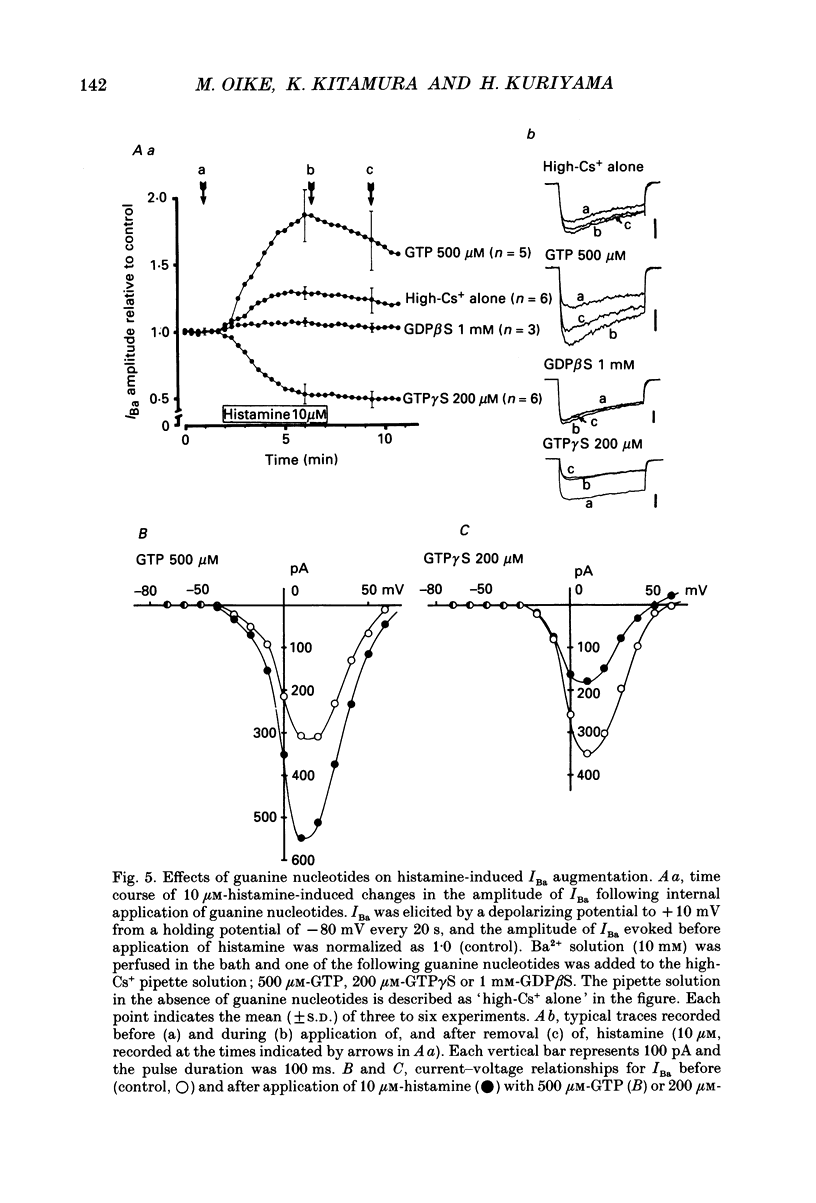
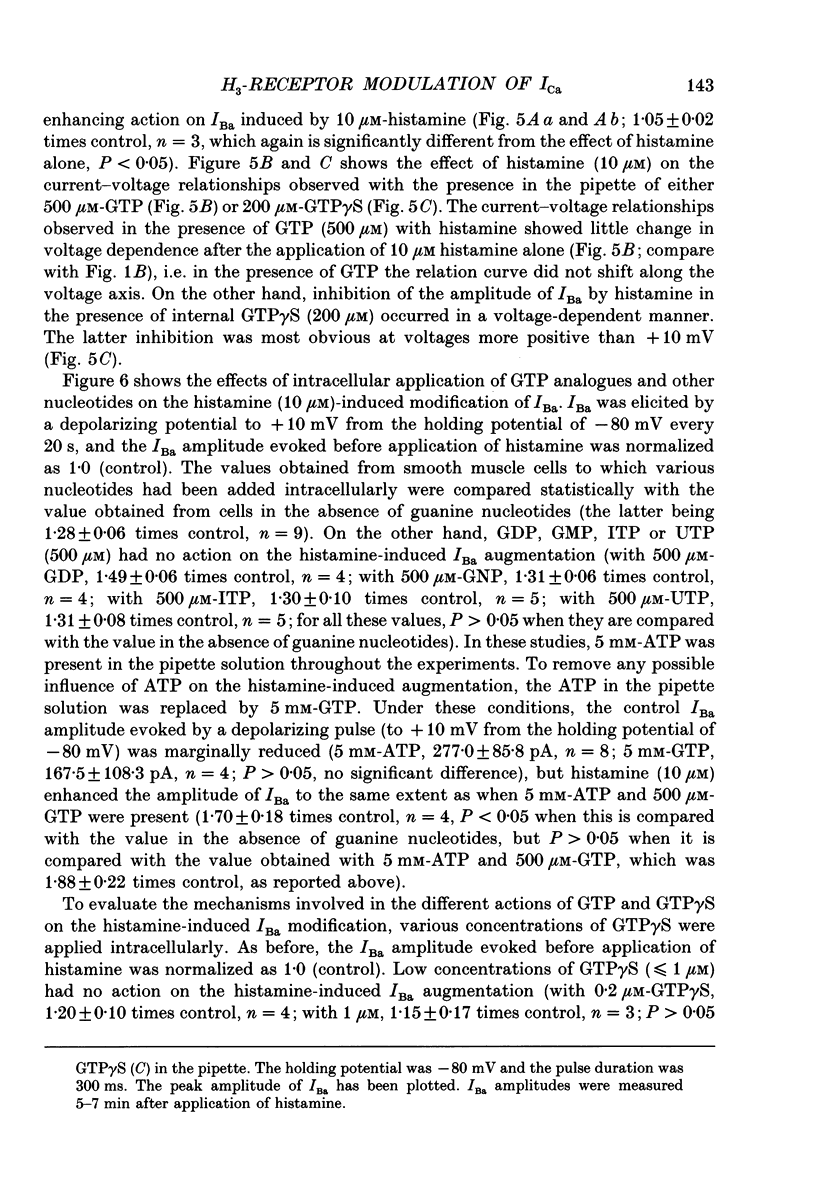
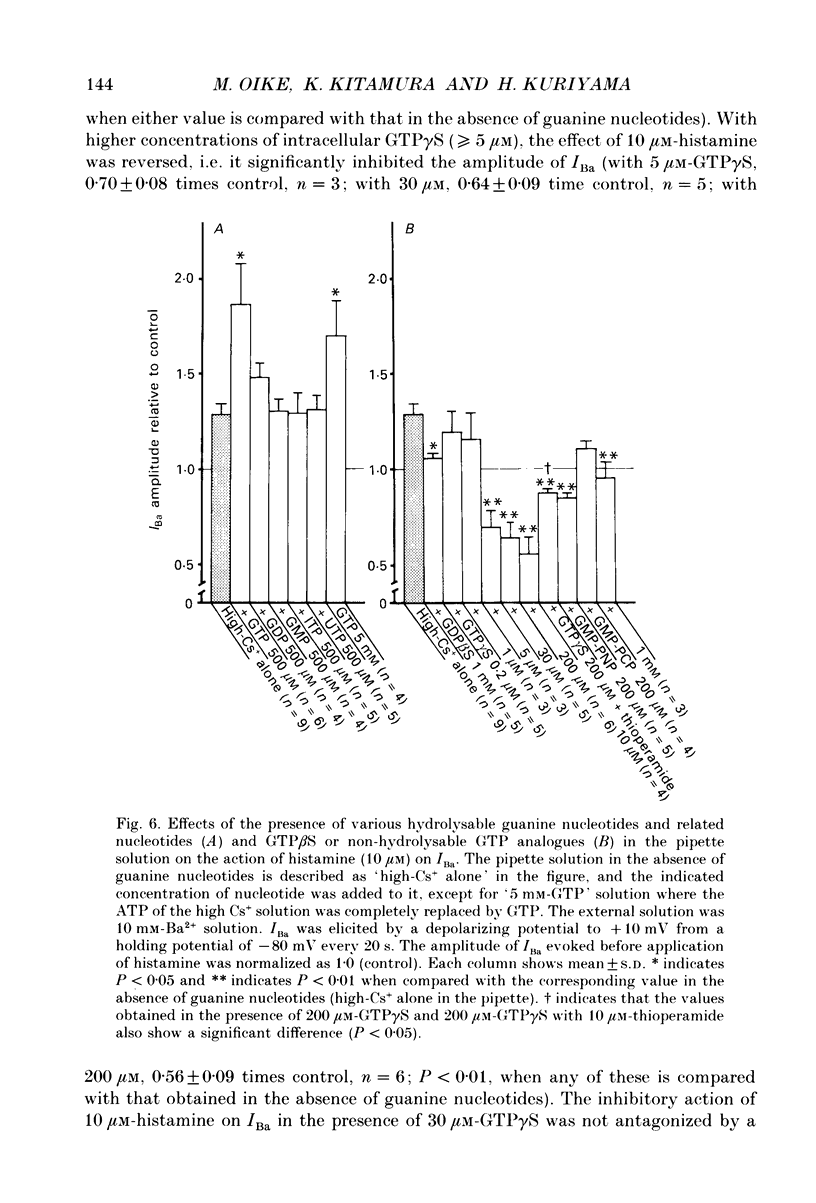
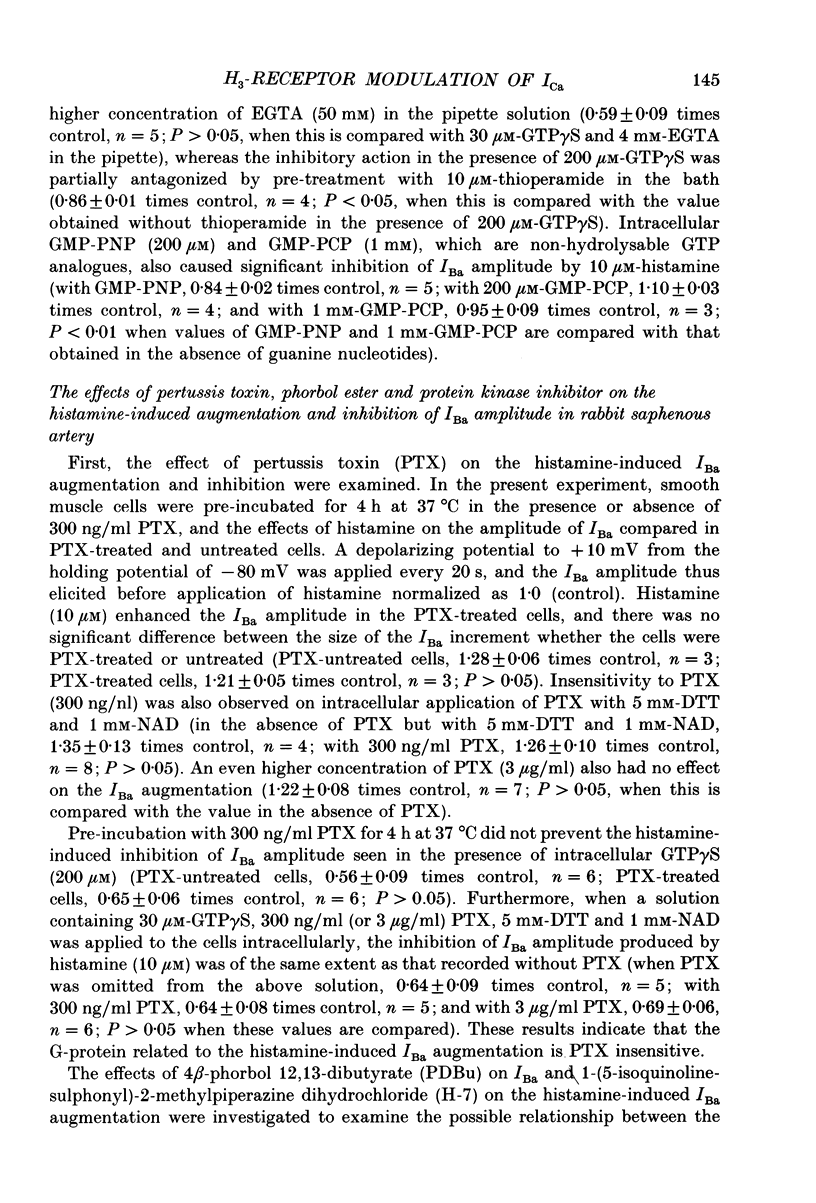
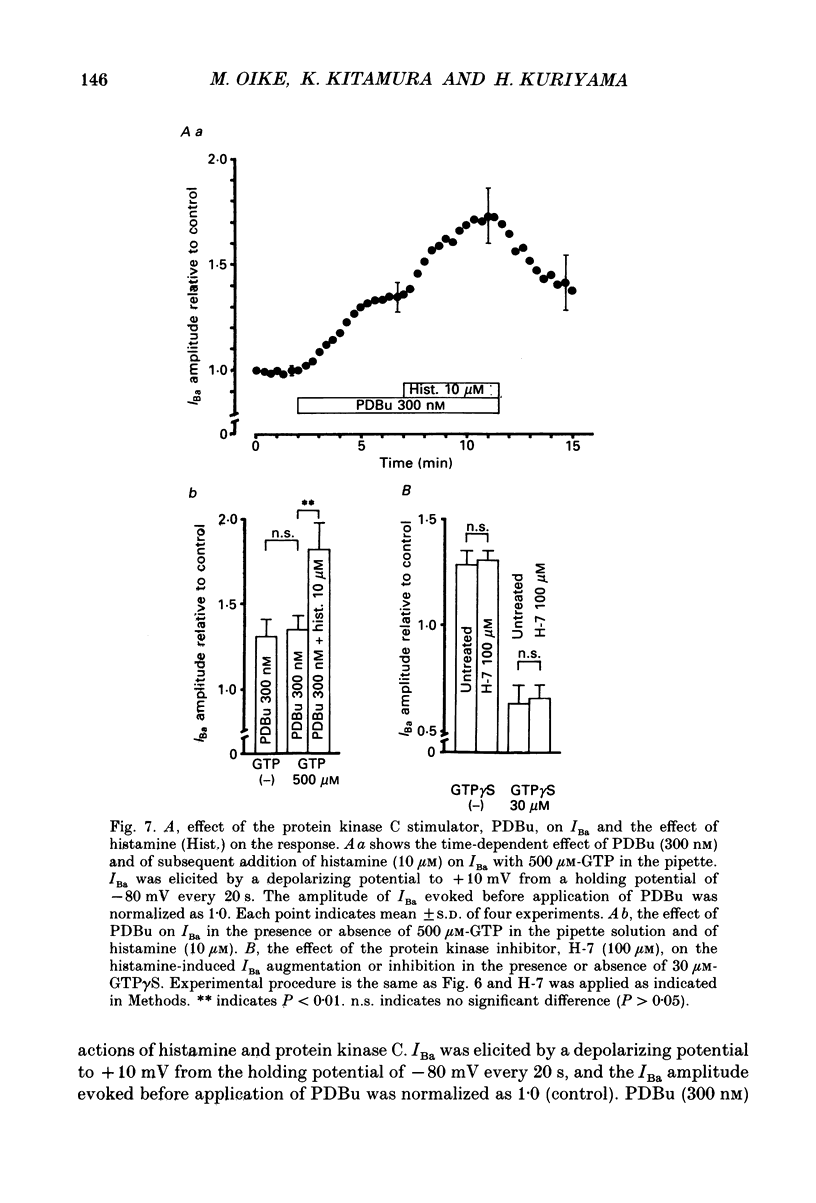
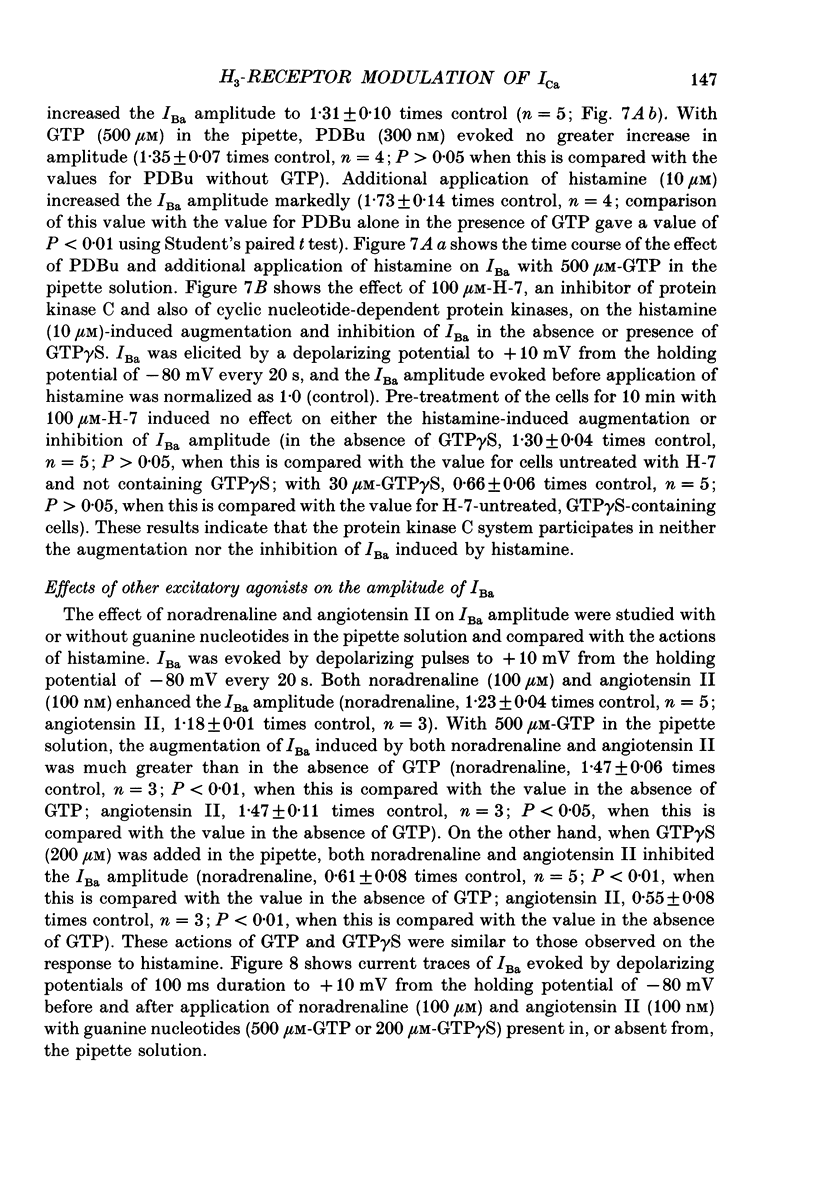
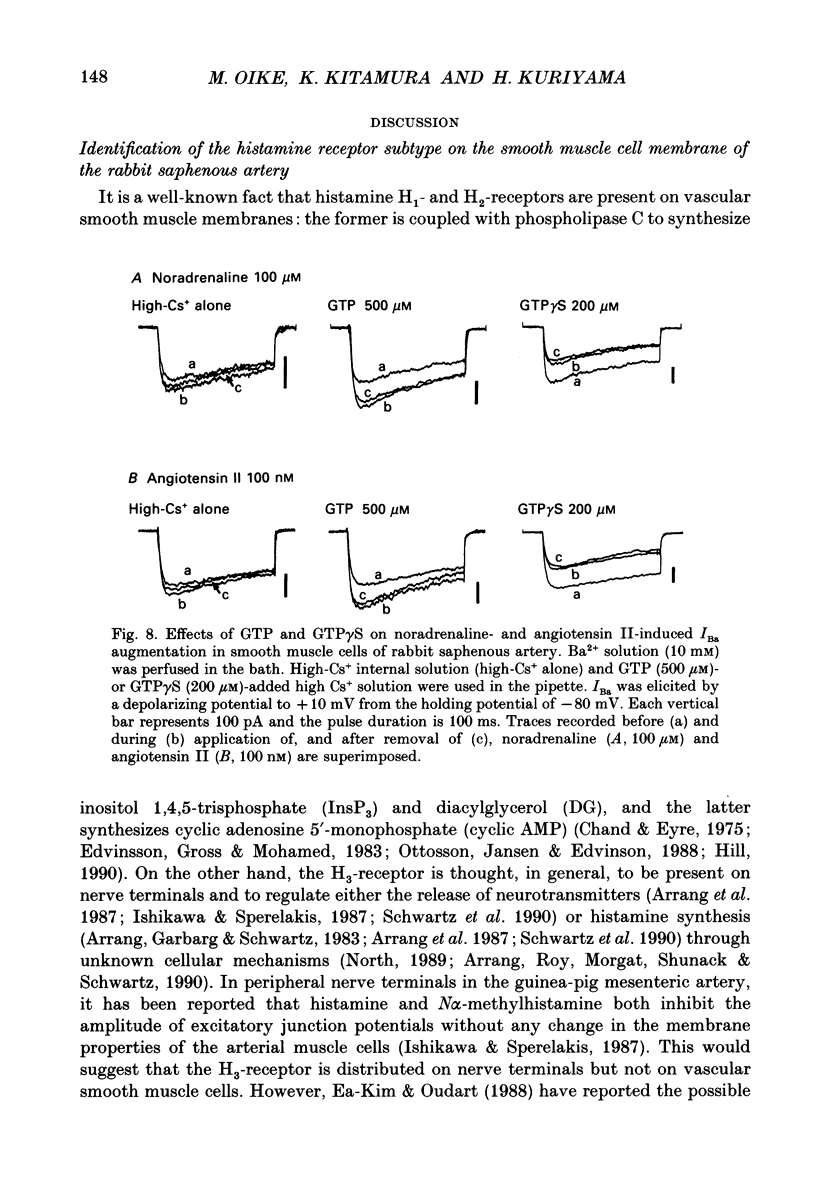
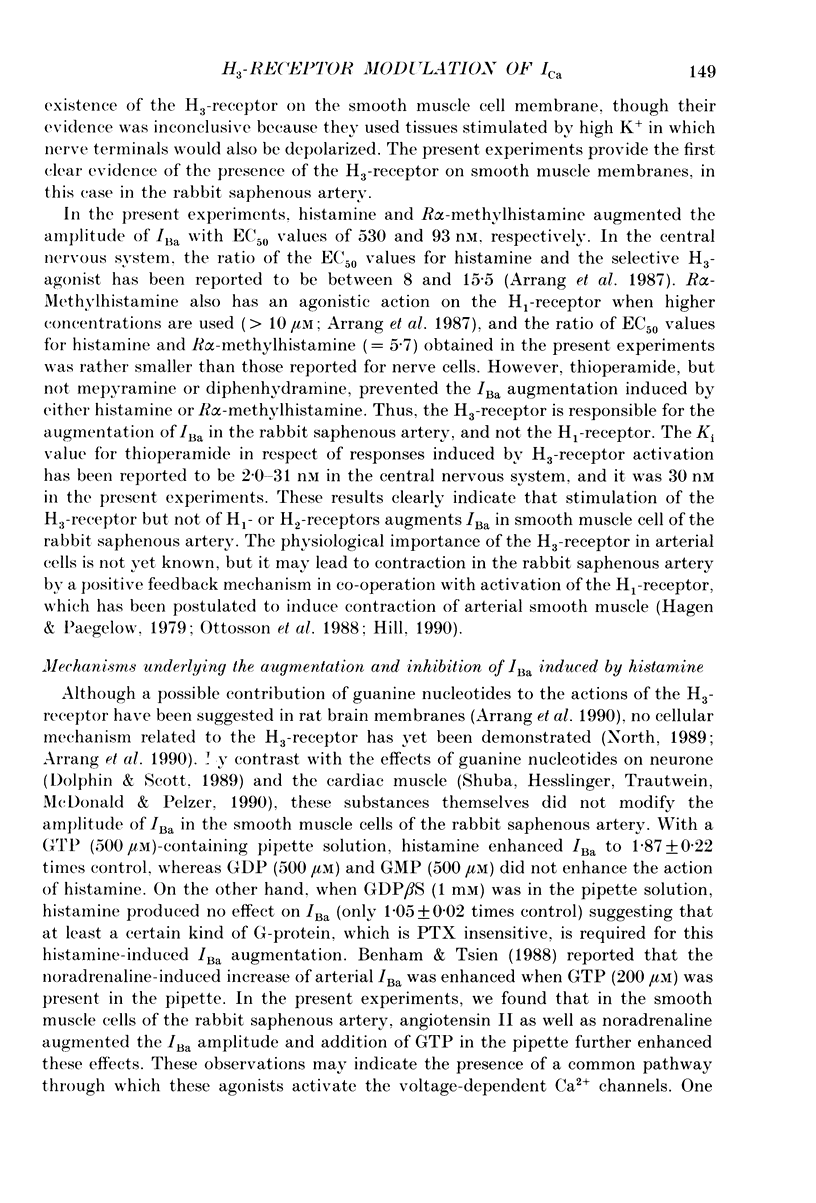
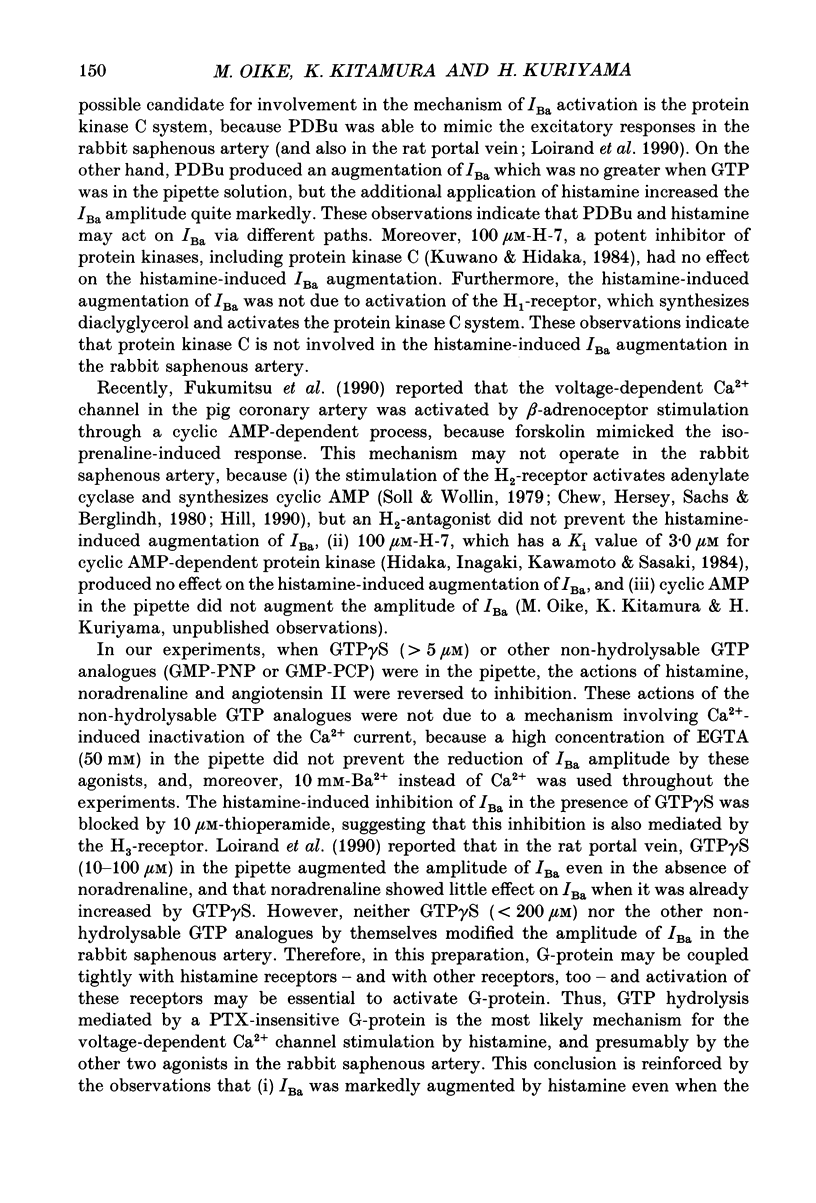
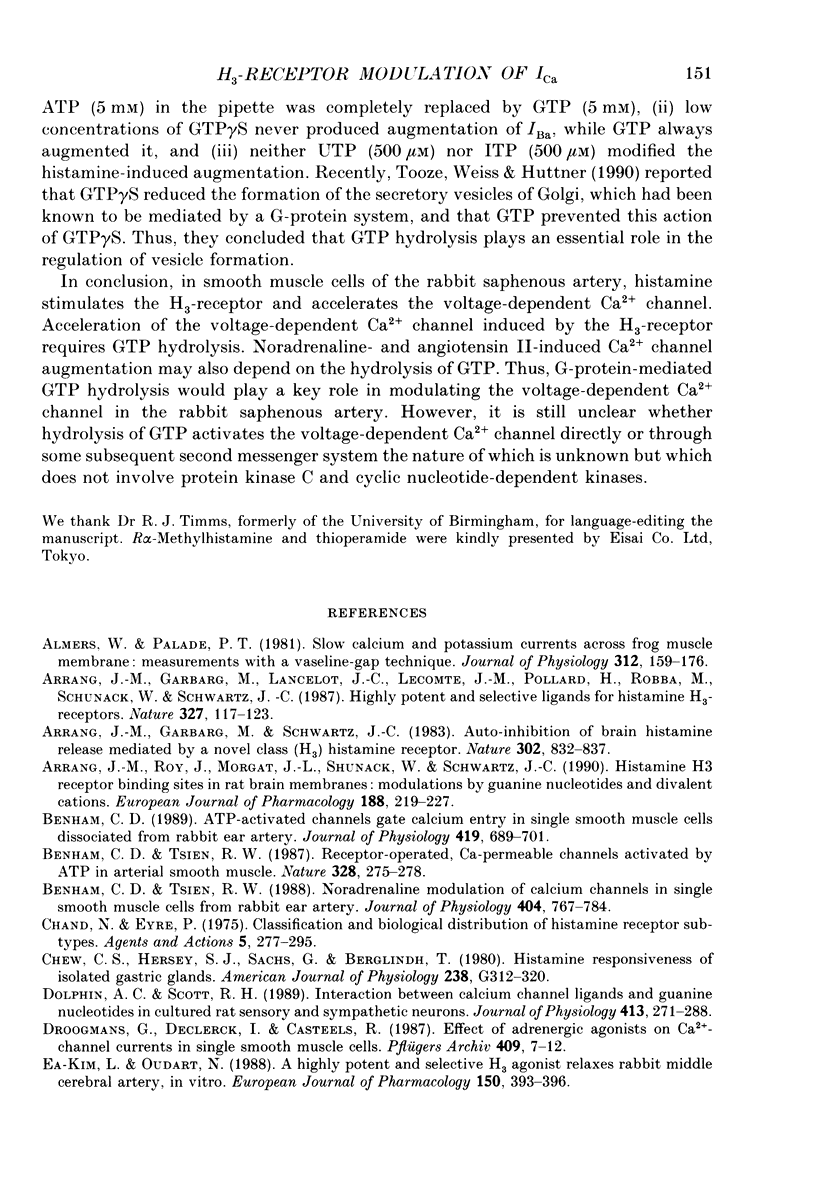
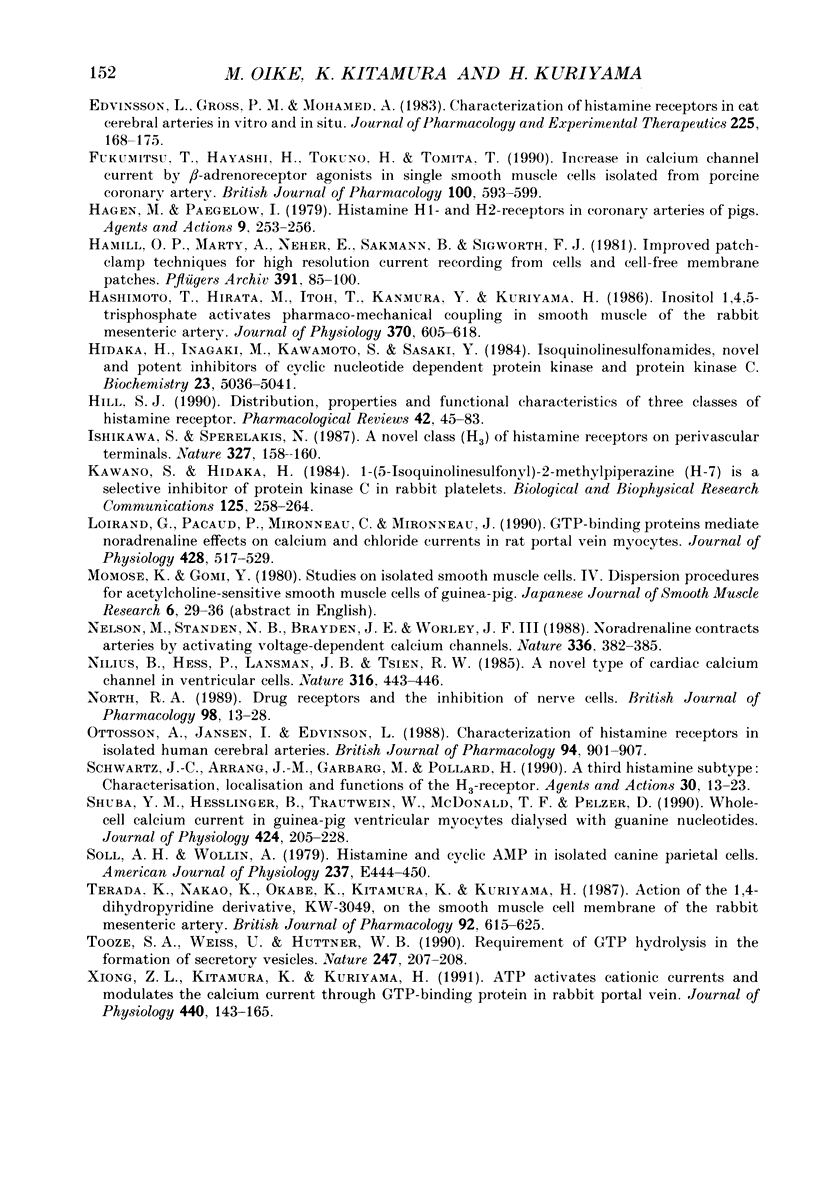
Selected References
These references are in PubMed. This may not be the complete list of references from this article.
- Almers W., Palade P. T. Slow calcium and potassium currents across frog muscle membrane: measurements with a vaseline-gap technique. J Physiol. 1981 Mar;312:159–176. doi: 10.1113/jphysiol.1981.sp013622. [DOI] [PMC free article] [PubMed] [Google Scholar]
- Arrang J. M., Garbarg M., Lancelot J. C., Lecomte J. M., Pollard H., Robba M., Schunack W., Schwartz J. C. Highly potent and selective ligands for histamine H3-receptors. Nature. 1987 May 14;327(6118):117–123. doi: 10.1038/327117a0. [DOI] [PubMed] [Google Scholar]
- Arrang J. M., Garbarg M., Schwartz J. C. Auto-inhibition of brain histamine release mediated by a novel class (H3) of histamine receptor. Nature. 1983 Apr 28;302(5911):832–837. doi: 10.1038/302832a0. [DOI] [PubMed] [Google Scholar]
- Arrang J. M., Roy J., Morgat J. L., Schunack W., Schwartz J. C. Histamine H3 receptor binding sites in rat brain membranes: modulations by guanine nucleotides and divalent cations. Eur J Pharmacol. 1990 Apr 25;188(4-5):219–227. doi: 10.1016/0922-4106(90)90005-i. [DOI] [PubMed] [Google Scholar]
- Benham C. D. ATP-activated channels gate calcium entry in single smooth muscle cells dissociated from rabbit ear artery. J Physiol. 1989 Dec;419:689–701. doi: 10.1113/jphysiol.1989.sp017893. [DOI] [PMC free article] [PubMed] [Google Scholar]
- Benham C. D., Tsien R. W. A novel receptor-operated Ca2+-permeable channel activated by ATP in smooth muscle. Nature. 1987 Jul 16;328(6127):275–278. doi: 10.1038/328275a0. [DOI] [PubMed] [Google Scholar]
- Benham C. D., Tsien R. W. Noradrenaline modulation of calcium channels in single smooth muscle cells from rabbit ear artery. J Physiol. 1988 Oct;404:767–784. doi: 10.1113/jphysiol.1988.sp017318. [DOI] [PMC free article] [PubMed] [Google Scholar]
- Chand N., Eyre P. Classification and biological distribution of histamine receptor sub-types. Agents Actions. 1975 Oct;5(4):277–295. doi: 10.1007/BF02205232. [DOI] [PubMed] [Google Scholar]
- Chew C. S., Hersey S. J., Sachs G., Berglindh T. Histamine responsiveness of isolated gastric glands. Am J Physiol. 1980 Apr;238(4):G312–G320. doi: 10.1152/ajpgi.1980.238.4.G312. [DOI] [PubMed] [Google Scholar]
- Dolphin A. C., Scott R. H. Interaction between calcium channel ligands and guanine nucleotides in cultured rat sensory and sympathetic neurones. J Physiol. 1989 Jun;413:271–288. doi: 10.1113/jphysiol.1989.sp017653. [DOI] [PMC free article] [PubMed] [Google Scholar]
- Droogmans G., Declerck I., Casteels R. Effect of adrenergic agonists on Ca2+-channel currents in single vascular smooth muscle cells. Pflugers Arch. 1987 Jun;409(1-2):7–12. doi: 10.1007/BF00584744. [DOI] [PubMed] [Google Scholar]
- Ea-Kim L., Oudart N. A highly potent and selective H3 agonist relaxes rabbit middle cerebral artery, in vitro. Eur J Pharmacol. 1988 Jun 10;150(3):393–396. doi: 10.1016/0014-2999(88)90026-x. [DOI] [PubMed] [Google Scholar]
- Edvinsson L., Gross P. M., Mohamed A. Characterization of histamine receptors in cat cerebral arteries in vitro and in situ. J Pharmacol Exp Ther. 1983 Apr;225(1):168–175. [PubMed] [Google Scholar]
- Fukumitsu T., Hayashi H., Tokuno H., Tomita T. Increase in calcium channel current by beta-adrenoceptor agonists in single smooth muscle cells isolated from porcine coronary artery. Br J Pharmacol. 1990 Jul;100(3):593–599. doi: 10.1111/j.1476-5381.1990.tb15852.x. [DOI] [PMC free article] [PubMed] [Google Scholar]
- Hagen M., Paegelow I. Histamine H1-and H2-receptors in coronary arteries of pigs. Agents Actions. 1979 Aug;9(3):253–256. doi: 10.1007/BF01966697. [DOI] [PubMed] [Google Scholar]
- Hamill O. P., Marty A., Neher E., Sakmann B., Sigworth F. J. Improved patch-clamp techniques for high-resolution current recording from cells and cell-free membrane patches. Pflugers Arch. 1981 Aug;391(2):85–100. doi: 10.1007/BF00656997. [DOI] [PubMed] [Google Scholar]
- Hashimoto T., Hirata M., Itoh T., Kanmura Y., Kuriyama H. Inositol 1,4,5-trisphosphate activates pharmacomechanical coupling in smooth muscle of the rabbit mesenteric artery. J Physiol. 1986 Jan;370:605–618. doi: 10.1113/jphysiol.1986.sp015953. [DOI] [PMC free article] [PubMed] [Google Scholar]
- Hidaka H., Inagaki M., Kawamoto S., Sasaki Y. Isoquinolinesulfonamides, novel and potent inhibitors of cyclic nucleotide dependent protein kinase and protein kinase C. Biochemistry. 1984 Oct 9;23(21):5036–5041. doi: 10.1021/bi00316a032. [DOI] [PubMed] [Google Scholar]
- Hill S. J. Distribution, properties, and functional characteristics of three classes of histamine receptor. Pharmacol Rev. 1990 Mar;42(1):45–83. [PubMed] [Google Scholar]
- Ishikawa S., Sperelakis N. A novel class (H3) of histamine receptors on perivascular nerve terminals. Nature. 1987 May 14;327(6118):158–160. doi: 10.1038/327158a0. [DOI] [PubMed] [Google Scholar]
- Kawamoto S., Hidaka H. 1-(5-Isoquinolinesulfonyl)-2-methylpiperazine (H-7) is a selective inhibitor of protein kinase C in rabbit platelets. Biochem Biophys Res Commun. 1984 Nov 30;125(1):258–264. doi: 10.1016/s0006-291x(84)80362-9. [DOI] [PubMed] [Google Scholar]
- Loirand G., Pacaud P., Mironneau C., Mironneau J. GTP-binding proteins mediate noradrenaline effects on calcium and chloride currents in rat portal vein myocytes. J Physiol. 1990 Sep;428:517–529. doi: 10.1113/jphysiol.1990.sp018225. [DOI] [PMC free article] [PubMed] [Google Scholar]
- Momose K., Gomi Y. [Studies on isolated smooth muscle cells. VI. Dispersion procedures for acetylcholine-sensitive smooth muscle cells of guinea pig (author's transl)]. Nihon Heikatsukin Gakkai Zasshi. 1980 Mar;16(1):29–36. doi: 10.1540/jsmr1965.16.29. [DOI] [PubMed] [Google Scholar]
- Nelson M. T., Standen N. B., Brayden J. E., Worley J. F., 3rd Noradrenaline contracts arteries by activating voltage-dependent calcium channels. Nature. 1988 Nov 24;336(6197):382–385. doi: 10.1038/336382a0. [DOI] [PubMed] [Google Scholar]
- Nilius B., Hess P., Lansman J. B., Tsien R. W. A novel type of cardiac calcium channel in ventricular cells. Nature. 1985 Aug 1;316(6027):443–446. doi: 10.1038/316443a0. [DOI] [PubMed] [Google Scholar]
- North R. A. Twelfth Gaddum memorial lecture. Drug receptors and the inhibition of nerve cells. Br J Pharmacol. 1989 Sep;98(1):13–28. doi: 10.1111/j.1476-5381.1989.tb16855.x. [DOI] [PMC free article] [PubMed] [Google Scholar]
- Ottosson A., Jansen I., Edvinsson L. Characterization of histamine receptors in isolated human cerebral arteries. Br J Pharmacol. 1988 Jul;94(3):901–907. doi: 10.1111/j.1476-5381.1988.tb11602.x. [DOI] [PMC free article] [PubMed] [Google Scholar]
- Schwartz J. C., Arrang J. M., Garbarg M., Pollard H. Plenary lecture. A third histamine receptor subtype: characterisation, localisation and functions of the H3-receptor. Agents Actions. 1990 Apr;30(1-2):13–23. doi: 10.1007/BF01968988. [DOI] [PubMed] [Google Scholar]
- Shuba Y. M., Hesslinger B., Trautwein W., McDonald T. F., Pelzer D. Whole-cell calcium current in guinea-pig ventricular myocytes dialysed with guanine nucleotides. J Physiol. 1990 May;424:205–228. doi: 10.1113/jphysiol.1990.sp018063. [DOI] [PMC free article] [PubMed] [Google Scholar]
- Soll A. H., Wollin A. Histamine and cyclic AMP in isolated canine parietal cells. Am J Physiol. 1979 Nov;237(5):E444–E450. doi: 10.1152/ajpendo.1979.237.5.E444. [DOI] [PubMed] [Google Scholar]
- Terada K., Nakao K., Okabe K., Kitamura K., Kuriyama H. Action of the 1,4-dihydropyridine derivative, KW-3049, on the smooth muscle membrane of the rabbit mesenteric artery. Br J Pharmacol. 1987 Nov;92(3):615–625. doi: 10.1111/j.1476-5381.1987.tb11364.x. [DOI] [PMC free article] [PubMed] [Google Scholar]
- Tooze S. A., Weiss U., Huttner W. B. Requirement for GTP hydrolysis in the formation of secretory vesicles. Nature. 1990 Sep 13;347(6289):207–208. doi: 10.1038/347207a0. [DOI] [PubMed] [Google Scholar]
- Xiong Z. L., Kitamura K., Kuriyama H. ATP activates cationic currents and modulates the calcium current through GTP-binding protein in rabbit portal vein. J Physiol. 1991;440:143–165. doi: 10.1113/jphysiol.1991.sp018701. [DOI] [PMC free article] [PubMed] [Google Scholar]


